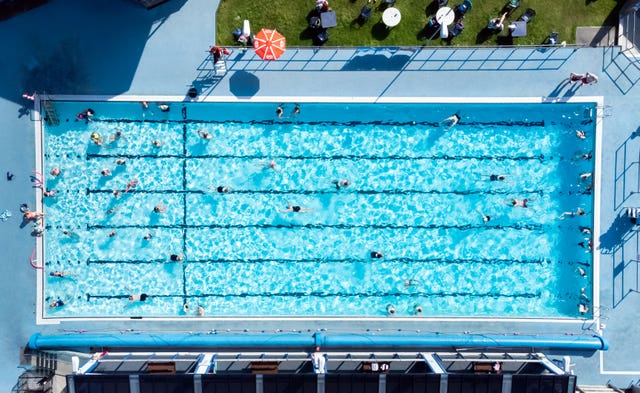
Almost 2,000 swimming pools in England could be lost by the end of the decade without urgent Government and local authority action, a new report has warned.
Swim England says pools built in the 1960s and 1970s are coming towards the end of their lifespan and are not being refurbished or replaced at a suitable rate, putting into question whether sufficient quality facilities will be available to both competitive and recreational swimmers in the decades to come.
Team GB enjoyed great success in the pool in Tokyo in the summer, securing a best-ever tally of eight medals made up of four golds, three silvers and one bronze.
But Swim England says that without a £1billion investment to refurbish existing pools and build new ones, there will be a “huge decline” in availability.
It published its report, A Decade In Decline: The Future of Swimming Pools In England, on Wednesday, and its chief executive Jane Nickerson said: “Swimming pools are naturally essential to the future of all our aquatic sports if we are to nurture the next Adam Peaty, Tom Daley, Anna Hopkin or Maisie Summers-Newton.
“However, they are so much more than that. Pools are hubs of the local community, helping people of all ages to lead healthier, happier lives and saving the NHS hundreds of millions of pounds each year.
“They are also the places where millions learn a skill that could one day save their life – or someone else’s.
“Without adequate investment into the new pools this country needs, we are forecasting a huge decline in the available water space by the end of the decade, threatening the future of our sports, leaving millions shut out of the activities they love and widening health inequities.
“The time to act is now.”
The report predicts that by 2030, on current trends, the number of pools will have dropped from 4,336 to around 2,468 – a fall of 40 per cent.
It also estimates that almost a quarter (23 per cent) of local authorities in England have a deficit of at least one average-sized pool.
Cllr Gerald Vernon-Jackson, the chairman of the Local Government Association’s Culture, Tourism and Sport Board, said: “Sixty per cent of swimming pools are past their expected lifespans or overdue refurbishment and account for up to 40 per cent of some councils’ direct carbon emissions.

“Alongside high running costs and financial constraints exacerbated by the Covid-19 pandemic, there is a real risk that we will lose these vital community assets. Capital investment for councils to redesign, upgrade and renovate facilities is urgently needed in the upcoming Spending Review to protect them and deliver on net zero targets.”
A spokesman for the Department for Digital, Culture, Media and Sport (DCMS) responded to the report by stating: “We have been clear that the nation’s health and fitness is a priority as we build back better from the pandemic.
“We have provided an unprecedented £1billion to ensure the survival of the grassroots, professional sport and leisure sectors. This includes our £100million National Leisure Centre Recovery Fund which has secured the survival and reopening of more than 1100 swimming pools across the country.
“On top of this Sport England has provided over £8.5million to swimming and diving projects, and over £16million to Swim England since 2017.”


Comments: Our rules
We want our comments to be a lively and valuable part of our community - a place where readers can debate and engage with the most important local issues. The ability to comment on our stories is a privilege, not a right, however, and that privilege may be withdrawn if it is abused or misused.
Please report any comments that break our rules.
Read the rules hereLast Updated:
Report this comment Cancel